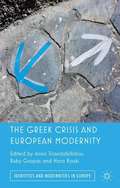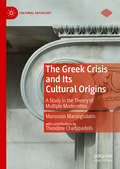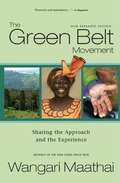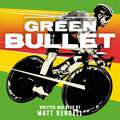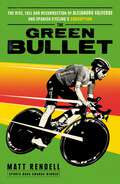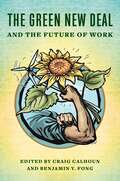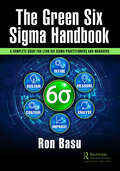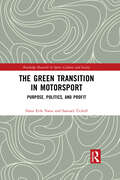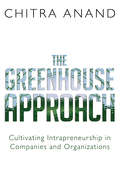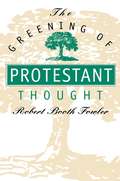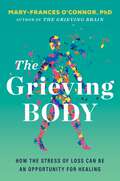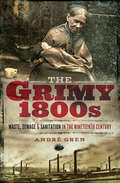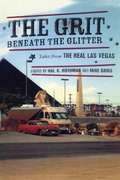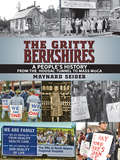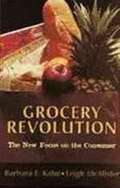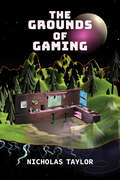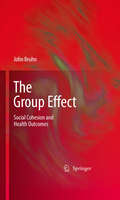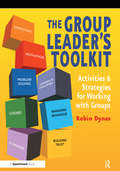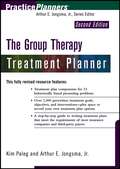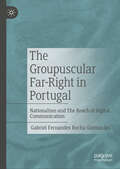- Table View
- List View
The Greek Crisis and European Modernity
by Hara Kouki Anna Triandafyllidou Ruby GropasThis collection explores the current economic and political crisis in Greece and more widely in Europe. Greece is used to illustrate and exemplify the contradictions of the dominant paradigm of European modernity, the ruptures that are inherent to it, and the alternative modernity discourses that develop within Europe. By critically reviewing the 'alternative' path to modernization that Greece has taken, the authors question whether the current Greek economic and political-moral crisis is the resulting failure of this 'alternative' or 'deviant' modernization model or whether it is the result of a wider crisis in the dominant European economic and political modernity paradigm.
The Greek Crisis and Its Cultural Origins: A Study in the Theory of Multiple Modernities (Cultural Sociology)
by Manussos MarangudakisThis original analysis of modern Greece’s political culture attempts to present a “total social fact”—a coherent and complex representation of Greek socio-political culture—to identify the cultural causes of Greece’s recent disastrous economic crisis. Using a culturalist frame inspired by the Yale Strong Program, Marangudakis argues that the core cultural orientations of Greece have determined its politics—Greek secular culture flows out of the religion of Eastern Orthodoxy with its mysticism, icons, and general “ortherworldly-nesses.” This theoretical discussion, bringing together Eisenstadt, Michael Mann, Banfield, and Taylor, is complemented by an innovative use of survey data, processed by political scientist and statistician Theodore Chadjipadelis. The carefully deployed quantitative data demonstrate that the culture previously described is actually shared by people living in Greece today. In his sweeping conclusion to this thorough cultural analysis, Marangudakis reflects on the prospects of Greek cultural recovery through the construction of a non-populist civil religion.
The Green Belt Movement
by Wangari MaathaiWhen Kenyan environmental and democracy activist Wangari Maathai became the first African woman to receive the Nobel Peace Prize in 2004, she capped a life full of firsts. She was the first African woman to earn a Ph.D. in Eastern and Central Africa, and the first woman to attain associate profes¬sorship and to hold a department chair at the University of Nairobi. In 1977, shocked at the environmental devastation caused by deforestation in her beloved Kenya, Maathai founded the Green Belt Movement (GBM). For twenty-seven years, GBM has enabled many people-particularly women-to plant trees in their regions, providing them with food and fuel, and halting soil erosion and desertification. GBM became much more than that, however. It became a movement for representative democracy that led to Kenya's 'first fully democratic elections in a generation, during which Maathai was elected to Parliament and made a minister for the environment. The Green Belt Movement: Sharing the Approach and the Experience is the story of the Green Belt Movement in Wangari Maathai's own words. It reveals the struggles and the structure of this extraordinary effort to reforest a vast region and free a people. Over the course of its history, nearly 30 million trees have been planted, and tens of thousands of people have earned a livelihood. The Green Belt Movement is the inspiring story of people working at the grassroots level to improve their environment and their country. Their story offers ideas about a new and hopeful future for Africa and the rest of the world.
The Green Bullet: The rise, fall and resurrection of Alejandro Valverde and Spanish cycling’s corruption
by Matt RendellNew from award-winning author Matt Rendell, an examination of the phenomenal success of Alejandro Valverde and the moral decay at the heart of Spanish cycling.'A study of a dominant force, a true gentleman racer despite his shadowy past' Dan MartinAlejandro Valverde - the 'Green Bullet' - was an international symbol of Spanish cycling for a quarter of a century before his retirement in 2022. Hard-working and supremely talented, he won the Vuelta a España and stood on the podium of the Giro d'Italia and the Tour de France. World champion in 2018, he was also the world's number-one-ranked rider four times. A man of indisputable charisma, he was also a convicted doping cheat.When the Spanish police investigation, Operación Puerto, uncovered a vast international blood doping ring, Valverde denied all involvement. The revelations unearthed by Operación Puerto threatened to force cycling off the road.Valverde's long career was a high wire walk between the venal interests that surround elite sport in Spain. In a nation beset by corruption, political incompetence and social division, Valverde's talent aided the public image of unscrupulous political and economic institutions.Even today, Valverde maintains his reticence. The Green Bullet breaks the silence.
The Green Bullet: The rise, fall and resurrection of Alejandro Valverde and Spanish cycling’s corruption
by Matt RendellNew from award-winning author Matt Rendell, an examination of the phenomenal success of Alejandro Valverde and the moral decay at the heart of Spanish cycling.'A study of a dominant force, a true gentleman racer despite his shadowy past' Dan MartinAlejandro Valverde - the 'Green Bullet' - was an international symbol of Spanish cycling for a quarter of a century before his retirement in 2022. Hard-working and supremely talented, he won the Vuelta a España and stood on the podium of the Giro d'Italia and the Tour de France. World champion in 2018, he was also the world's number-one-ranked rider four times. A man of indisputable charisma, he was also a convicted doping cheat.When the Spanish police investigation, Operación Puerto, uncovered a vast international blood doping ring, Valverde denied all involvement. The revelations unearthed by Operación Puerto threatened to force cycling off the road.Valverde's long career was a high wire walk between the venal interests that surround elite sport in Spain. In a nation beset by corruption, political incompetence and social division, Valverde's talent aided the public image of unscrupulous political and economic institutions.Even today, Valverde maintains his reticence. The Green Bullet breaks the silence.
The Green Economy and the Water-Energy-Food Nexus
by Robert C. BrearsThis book argues that a variety of policies will be required to create synergies between the water-energy-food nexus sectors while reducing trade-offs in the development of a green economy. Despite rising demand for water, energy and food globally, the governance of water-energy-food sectors has generally remained separate with limited attention placed on the interactions that exist between them. Brears provides readers with a series of in-depth case studies of leading cities, states, nations and regions of differing climates, lifestyles and income-levels from around the world that have implemented a variety of policy innovations to reduce water-energy-food nexus pressures and achieve green growth. The Green Economy and the Water-Energy-Food Nexus will be of interest to town and regional planners, resource conservation managers, policymakers, international companies and organisations interested in reducing water-energy-food nexus pressures, environmental NGOs, researchers, graduate and undergraduate students.
The Green New Deal and the Future of Work
by Raj Patel Harvey Molotch Harry C. Boyte Richard Lachmann Stephanie Luce Richard A. Walker Clark A. Miller Trygve Throntveit Alyssa Battistoni Daniel Aldana Cohen Hillary Angelo Olúfẹ́mi O. Táíwò Jim Goodman Wilson Sherwin Dustin Guastella Mindy Isser Todd E. Vachon J. Mijin Cha Lara SkinnerCatastrophic climate change overshadows the present and the future. Wrenching economic transformations have devastated workers and hollowed out communities. However, those fighting for jobs and those fighting for the planet have often been at odds. Does the world face two separate crises, environmental and economic? The promise of the Green New Deal is to tackle the threat of climate change through the empowerment of working people and the strengthening of democracy. In this view, the crisis of nature and the crisis of work must be addressed together—or they will not be addressed at all.This book brings together leading experts to explore the possibilities of the Green New Deal, emphasizing the future of work. Together, they examine transformations that are already underway and put forth bold new proposals that can provide jobs while reducing carbon consumption—building a world that is sustainable both economically and ecologically. Contributors also debate urgent questions: What is the value of a federal jobs program, or even a jobs guarantee? How do we alleviate the miseries and precarity of work? In key economic sectors, including energy, transportation, housing, agriculture, and care work, what kind of work is needed today? How does the New Deal provide guidance in addressing these questions, and how can a Green New Deal revive democracy? Above all, this book shows, the Green New Deal offers hope for a better tomorrow—but only if it accounts for work’s past transformations and shapes its future.
The Green Six Sigma Handbook: A Complete Guide for Lean Six Sigma Practitioners and Managers
by Ron BasuThis book is a hands-on single-source reference of tools, techniques, and processes integrating both Lean and Six Sigma. This comprehensive handbook provides up-to-date guidance on how to use these tools and processes in different settings, such as start-up companies and stalled projects, as well as establish enterprises where the ongoing drive is to improve processes, profitability, and long-term growth. It contains the "hard" Six Sigma approach as well as the flexible approach of FIT SIGMA, which is adaptable to manufacturing and service industries and also public sector organisations. You will also discover how climate change initiatives can be accelerated to sustainable outcomes by the holistic approach of Green Six Sigma. The book is about what we can do now with leadership, training, and teamwork in every sphere of our businesses. Lean, originally developed by Toyota, is a set of processes and tools aimed at minimising wastes. Six Sigma provides a set of data-driven techniques to minimise defects and improve processes. Integrating these two approaches provides a comprehensive and proven approach that can transform an organisation. To make change happen, we need both digital tools and analog approaches. We know that there has been a continuous push to generate newer approaches to operational excellence, such as Total Quality Management, Six Sigma, Lean Sigma, Lean Six Sigma, and FIT SIGMA. It is vital that we harness all our tools and resources to regenerate the economy after the Covid-19 pandemic and make climate change initiatives successful for the survival of our planet. Six Sigma and its hybrids (e.g., Lean Six Sigma) should also play a significant part. Over the last three decades, operational performance levels of both public sector and private sector organisations improved significantly and Lean Six Sigma has also acted as a powerful change agent. We urgently need an updated version of these tools and approaches. The Green Six Sigma Handbook not only applies appropriate Lean and Six Sigma tools and approaches, fitness for the purpose, but it aims at sustainable changes. This goal of sustainability is a stable bridge between Lean Six Sigma and climate change initiatives. Hence, when the tools and approaches of Lean Six Sigma are focused and adapted primarily to climate change demands, we get Green Six Sigma.
The Green Transition in Motorsport: Purpose, Politics, and Profit (Routledge Research in Sport, Culture and Society)
by Hans Erik Næss Samuel TickellThis book is a critical exploration of motorsport’s contribution to ‘the green transition’, understood as a societal shift towards a fossil-free future, a circular economy, and greater social inclusiveness. The book takes a critical look at the historical impact of motorsport and the current business and sporting models that determine its sustainability, as well as the innovation that might contribute solutions to wider social and environmental problems. Drawing on perspectives from sociology, media and sport business, the book unpacks the complexity of stakeholder interests in motorsport that might constrain positive change. Presenting cases and data from Formula One, Formula E, Extreme E, the World Rally Championship, NASCAR and the World Endurance Championship, the book considers the technological and organizational change required to address the triple bottom line of financial, environmental and social sustainability, and looks at how audiences, markets, teams, governing bodies, corporations, and state actors combine to shape the social and economic environments within which motorsport takes place. Representing a unique case study of the impact of elite sport on wider society, this book is fascinating reading for anybody with an interest in motorsport, sport business, sustainable business, or environment, society and culture.
The Greenhouse Approach: Cultivating Intrapreneurship in Companies and Organizations
by Chitra AnandTo succeed, modern businesses need to foster the creativity of their staff; they need to provide an environment that promotes constant innovation. Intrapreneurship, which harnesses the entrepreneurial drive within an existing organization to foster new ideas and creative thinking, gives companies the problem-solving edge to succeed in an ever-changing world. To stay on top, companies need to empower all their employees — their rebels, their trend spotters, their communicators, their researchers — to find and implement new ways of operating. The Greenhouse Approach shows how companies and organizations can use creative thinking to reimagine current norms and structures and develop a culture of intrapreneurship, equipping them with the tools to anticipate and adapt to change.
The Greening of America
by Charles A. ReichThere is a revolution coming. It will not be like revolutions of the past. It will originate with the individual and the with culture, and it will change the political structure only as its final act. It will not require violence to succeed, and it cannot be successfully resisted by violence. This is the revolution of the new generation.
The Greening of Protestant Thought
by Robert Booth FowlerThe Greening of Protestant Thought traces the increasing influence of environmentalism on American Protestantism since the first Earth Day, which took place in 1970. Robert Booth Fowler explores the extent to which ecological concerns permeate Protestant thought and examines contemporary controversies within and between mainline and fundamentalist Protestantism over the Bible's teachings about the environment. Fowler explores the historical roots of environmentalism in Protestant thought, including debates over God's relationship to nature and the significance of the current environmental crisis for the history of Christianity. Although he argues that mainline Protestantism is becoming increasingly 'green,' he also examines the theological basis for many fundamentalists' hostility toward the environmental movement. In addition, Fowler considers Protestantism's policy agendas for environmental change, as well as the impact on mainline Protestant thinking of modern eco-theologies, process and creation theologies, and ecofeminism.
The Grieving Body: How the Stress of Loss Can Be an Opportunity for Healing
by Mary-Frances O'ConnorThe follow-up to celebrated grief expert, neuroscientist, and psychologist Dr. Mary-Frances O’Connor’s The Grieving Brain focuses on the impact of grief—and life’s other major stressors—on the human body. Coping with death and grief is one of the most painful human experiences. While we can speak to the psychological and emotional ramifications of loss and sorrow, we often overlook its impact on our physical bodies. Dr. Mary-Frances O’Connor specializes in the study of grief, and in The Grieving Body she shares vital scientific research, revealing imperative new insights on its profound physiological impact. As she did in The Grieving Brain, O’Connor combines illuminating studies and personal stories to explore the toll loss takes on our cardiovascular, endocrine, and immune systems and the larger implications for our long-term well-being.The Grieving Body addresses questions about how bereavement affects us, such as:Can we die of a broken heart?What happens in our bodies when we’re grieving?How do our coping behaviors affect our physical health?What is the cognitive impact of grief?Why are we more prone to illness during times of enormous stress?and moreResearch-backed, warm, and empathetic, The Grieving Body is an essential, hopeful read for those experiencing loss as well as their supportive friends and family.The Grieving Body is illustrated with black-and-white charts and graphs.
The Grimy 1800s: Waste, Sewage, & Sanitation in Nineteenth Century Britain
by Andre GrenChronicles of the filth, foulness, and public health disasters found by &“inspectors of nuisances&” in a newly industrialized world. In the nineteenth century, as towns grew, Britain became increasingly grimy. The causes of dirt and pollution were defined legally as &“nuisances&” and, in 1835, the new local authorities very rapidly appointed an army of &“inspectors of nuisances.&” This book reveals the Victorian era from a very different point of view: it offers the inspectors&’ eyewitness accounts and details the workings of the Parliamentary Committees that were set up in an attempt to ease the struggle against filth. Inspectors battled untreated human excreta in rivers black as ink, as well as unsanitary drinking water, home to tadpoles and portions of frogs so large that they blocked taps. They dealt with putrid animal carcasses in cattle markets and slaughterhouses, not to mention the unabated smoke from mill chimneys that covered towns with a thick layer of black grime. Boggle Hole Pond was a source of drinking water full of dead dogs; ice cream was coated in bugs; stinking rotting crabs, poultry, and pigeon smells polluted the air. Even the corpses floating out of badly drained burial grounds were &“nuisances,&” leading to the practice of burning the remains of the dead. This is the history of a grimy century in the throes of the Industrial Revolution, illustrating the many ways in which the country responded to the ever growing demands of a new world.
The Grimy 1800s: Waste, Sewage, and Sanitation in Nineteenth Century Britain
by Andre GrenIn the nineteenth century, as towns grew, Britain became increasingly grimy. The causes of dirt and pollution were defined legally as ‘nuisances’ and, in 1835, the new local authorities very rapidly appointed an army of ‘inspectors of nuisances’. This book is the inspectors’ chronicle: it offers their eyewitness accounts and a plethora of details pertaining to the workings of the scrutinizing Parliamentary Committees that were set up in an attempt to ease the struggles against filth. Inspectors battled untreated human excreta in rivers black as ink, as well as insanitary drinking water, home to tadpoles and portions of frogs so large that they blocked taps. They dealt with putrid animal carcasses in cattle markets and slaughterhouses, not to mention the unabated smoke from mill chimneys that covered towns with a thick layer of black grime. Boggle Hole Pond was a source of drinking water full of dead dogs; ice cream was coated in bugs; stinking rotting crabs, poultry and pigeon smells polluted the air. Even the dead floating out of badly drained burial grounds were ‘nuisances’, leading to the practice of burning the remains of the dead. This is the history of a grimy century in the throes of the Industrial Revolution, illustrating the many ways in which the country responded to the ever growing demands of a new age of industry.
The Gristmill (Historic Communities)
by Bobbie KalmanEarly pioneers would travel from far and wide to visit the gristmill for the essential service of having their grain ground. Communities often developed in areas where gristmills had been built. In the Gristmill young readers will find out
The Gritty Berkshires: A People's History From The Hoosac Tunnel To Mass Moca
by Maynard SeiderAs The Gritty Berkshires makes clear, Massachusetts' westernmost county is not just art museums, music festivals and beautiful scenery. For generations of working class families who have lived in the northern part of this county, their reality looks more like Rust Belt America. Maynard Seider, an activist sociologist who has taught and researched in the area for more than three decades, places the history of the North Berkshire region in the context of U.S. and global history. Through the use of oral histories, union archives, newspaper accounts and participant observation, the author focuses on the 1,000 men who built the nation's longest railroad tunnel, the thousands of men and women who worked in its textile mills and electronics factories and who struck, built worker co-ops, and community coalitions to improve their daily lives. In this history, we learn how the Berkshires offer insight into so many crucial aspects of the American experience. Moving from the early 1800s to the present, Seider weaves a narrative that details the area's vibrant immigrant history, slavery's role in its textile industry, the battle for national unions and the ideological struggles with corporate elites over who best speaks for the community. Enriched by dozens of photographs, these stories focus on the voices of ordinary people as they often do extraordinary things. Seider concludes his book by considering the question of "What's next?" through a case study of the Massachusetts Museum of Contemporary Art (MASS MoCA). These brick buildings which housed generations of blue and white collar workers until 1986 now attract tourists to the country's largest contemporary art collection. Yet the unanswered question remains, can a tourist-service economy provide a meaningful and economically sustainable life for its residents? The Gritty Berkshires' last section deals with this question both nationally and locally, exploring diverse responses amidst the nation's growing inequality, militarism and cutbacks in social services.
The Grocery Revolution: The New Focus on the Consumer
by Barbara E. Kahn Leigh M. McalisterThis text provides an introduction to the understanding of changing consumer behaviour and trends in managerial practice in the grocery industry.
The Ground Between: Anthropologists Engage Philosophy
by Michael Jackson Veena Das Arthur Kleinman Bhrigupati SinghThe guiding inspiration of this book is the attraction and distance that mark the relation between anthropology and philosophy. This theme is explored through encounters between individual anthropologists and particular regions of philosophy. Several of the most basic concepts of the discipline--including notions of ethics, politics, temporality, self and other, and the nature of human life--are products of a dialogue, both implicit and explicit, between anthropology and philosophy. These philosophical undercurrents in anthropology also speak to the question of what it is to experience our being in a world marked by radical difference and otherness. In The Ground Between, twelve leading anthropologists offer intimate reflections on the influence of particular philosophers on their way of seeing the world, and on what ethnography has taught them about philosophy. Ethnographies of the mundane and the everyday raise fundamental issues that the contributors grapple with in both their lives and their thinking. With directness and honesty, they relate particular philosophers to matters such as how to respond to the suffering of the other, how concepts arise in the give and take of everyday life, and how to be attuned to the world through the senses. Their essays challenge the idea that philosophy is solely the province of professional philosophers, and suggest that certain modalities of being in the world might be construed as ways of doing philosophy.Contributors. João Biehl, Steven C. Caton, Vincent Crapanzano, Veena Das, Didier Fassin, Michael M. J. Fischer, Ghassan Hage, Clara Han, Michael Jackson, Arthur Kleinman, Michael Puett, Bhrigupati Singh
The Grounds of Gaming (Digital Game Studies)
by Nicholas TaylorHow do we make space for video games in the places where we live, work, and play—and who is allowed to feel welcome there? Despite attempts to expand games beyond their conventional audience of young men, the physical contexts of gameplay and production remain off-limits and unsafe for so many.The Grounds of Gaming explores the physical places where games are played and how they contribute to the persistence of gaming's problematic politics. Drawing on fieldwork in an array of sites, author Nicholas Taylor explores the real-world settings where games are played, watched, discussed and designed. Sometimes these places are sticky, dark, and stinky; other times they are pristine and well appointed. Situating its chapters in such scenes as domestic gaming setups, campus computer labs, LAN parties, esports arenas, and convention centers, Taylor maps the infrastructural connections between games, place, masculinity, and whiteness.By inviting us to reconsider gaming's cultural politics from the ground up, The Grounds of Gaming offers new theoretical insights and practical resources regarding how to make game cultures and industries more inclusive.
The Group Effect
by John BruhnSociologists and anthropologists have had a long interest in studying the ways in which cultures shaped different patterns of health, disease, and mortality. Social scientists have documented low rates of chronic disease and disability in non-Western societies and have suggested that social stability, cultural homogeneity and social cohesion may play a part in explaining these low rates. On the other hand, in studies of Western societies, social scientists have found that disease and mortality assume different patterns among various ethnic, cultural and social-economic groups. The role of stress, social change and a low degree of cohesion have been suggested, along with other factors as contributing to the variable rates among different social groups. Social cohesion has been implicated in the cause and recovery from both physical and psychological illnesses. Although there has been a large amount of work established the beneficial effects of cohesion on health and well-being, relatively little work has focused on HOW increased social cohesion sustains or improves health. This work is based on the premise that there are risk factors, including social cohesion that regulate health and disease in groups. One of the challenges is how to measure social cohesion - it can be readily observed and experienced but difficult to quantify. A better understanding of how social cohesion works will be valuable to improving group-level interventions.
The Group Leader's Toolkit: Activities and Strategies for Working with Groups
by Robin DynesAn essential resource for all kinds of groups, these tried and tested strategies will stimulate and encourage full participation from all group members. Provides ideas for introducing group members to each other, breaking down barriers, energising people, helping people learn, moving the group on, building trust between group members, motivating people, assessing and evaluating the group, managing behaviour and personal responsibility, and ending sessions. The activities are set out in a clear, easy to follow format, with variations and guidance for adapting the activities. Will enable group leaders to promote group members' self development, meet the needs of their different learning styles, stimulate their creativity and develop their thinking skills. This toolkit is an invaluable resource for tutors, occupational therapists, nurses, care staff, probation staff, youth leaders or anyone - new or experienced - who works with groups.
The Group Therapy Treatment Planner
by Arthur E. Jongsma Kim PalegThe Group Therapy Treatment Planner, Second Edition provides all the elements necessary to quickly and easily develop formal treatment plans that satisfy the demands of HMOs, managed care companies, third-party payors, and state and federal review agencies. A critical tool for mental health professionals developing formal treatment plans for working with a variety of groups New edition features expanded coverage and outlines entirely new areas including utilizing group therapy to treat panic/agoraphobia, PTSD/trauma, adult ADHD, obsessive-compulsive disorder, and borderline personality disorder Streamlined interventions and fully updated language make this edition easier to use and more clinically applicable Saves you hours of time-consuming paperwork, yet offers the freedom to develop customized treatment plans Organized around 33 main presenting problems with a focus on applying a group therapy approach to a wide variety of disorders Over 1,000 well-crafted, clear statements describe the behavioral manifestations of each relational problem, long-term goals, short-term objectives, and clinically tested treatment options Easy-to-use reference format helps locate treatment plan components by behavioral problem or DSM-IV-TR diagnosis Includes a sample treatment plan that conforms to the requirements of most third-party payors and accrediting agencies (including HCFA, JCAHO, and NCQA)
The Groupuscular Far-Right in Portugal: Nationalism and The Reach of Digital Communication
by Gabriel Fernandes GuimarãesThis book analyzes two types of nationalisms that are represented by the Portuguese groupuscular right, that is, the extra-party right. One faction is guided by ethnonationalism and nativism, looking at Portugal through an ethnically European prism. Small groups fight for a white Portugal linked to an imagined white world, rooted in ideas such as race and biology, following models from the US. The other faction looks for a future in a non-European confederation and wants Portuguese citizenship for non-European groups originating from the former colonies, while maintaining ties with the Portuguese extreme right, notably, the one that comes from the Salazar right-wing dictatorship (Estado Novo, 1926–1974). This faction suggests addressing questions of immigration by accepting immigration of non-European people from former imperial space and by initiating a confederation of countries, in which Portugal is the only state with a white majority. Guimarães analyzes the means of communication of these two factions, the language they use to articulate their viewpoints, and the worldviews of various groups in Portugal. He argues that the far right in Portugal is a space filled with radical styles of nationalism.
